Iranian Activists Face Grave Charges In Judiciary's Crackdown
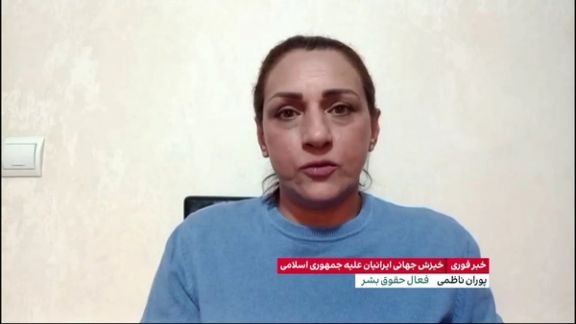
The Iranian judiciary has leveled serious charges against a group of civil and human rights activists.

The Iranian judiciary has leveled serious charges against a group of civil and human rights activists.
Dadban, a collective of pro-bono lawyers in Iran defending political prisoners and human rights advocates, reported that the Judiciary of the Islamic Republic has accused several individuals of "Moharebeh," or war against God, and "Corruption on Earth," offenses that could potentially lead to the death penalty.
According to the disclosed information, the Islamic Revolutionary Court of Jiroft, a city located in the southern Kerman province, has initiated legal proceedings against at least four civil and human rights activists.
Among them is Puran Nazemi, a writer, poet, political activist, and human rights advocate. Nazemi, who has experienced multiple arrests and imprisonments over the past four decades, was detained twice during the anti-regime protests last year.
In late October 2021, intelligence agents conducted a raid on Nazemi's residence, subsequently transferring her to Evin Prison and placing her in solitary confinement. Although she was released two months later, she was re-arrested in February while visiting her father at a hospital and was then relocated to an undisclosed detention facility.
Dadban, relying on documentation acquired from an inside source within the Kerman Judiciary, has exposed that Nazemi and three other activists are also accused of endangering national security, inciting the public to commit acts against domestic security, insulting authorities and officials, and propagating against the Islamic Republic, among other allegations.
The identities of the other accused individuals have not been revealed. Throughout the Iranian uprisings against the Islamic Republic, around 22,000 citizens were detained, with many facing serious charges. To date, seven protesters have been executed.
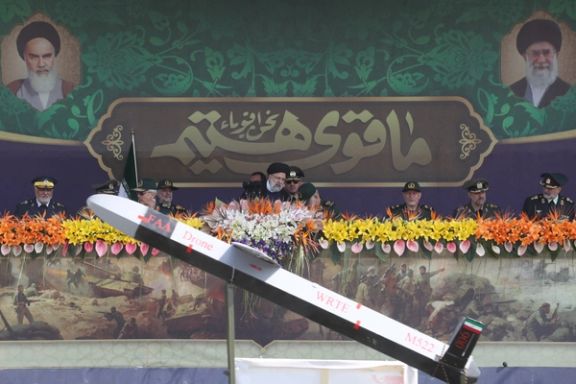
The UN sanctions on Iran’s missile program expired Wednesday, a victory for Tehran and raising concerns about the accelerated proliferation of its dangerous weapons.
The Iranian ministries of foreign affairs and defense issued separate statements announcing the end of UN prohibitions aimed at constraining Iran's missile and drone activities under Security Council Resolution (UNSCR) 2231, which endorsed the now defunct 2015 nuclear deal. The Islamic Republic is now free to sell its drones, ballistic missiles, and related long-range strike technologies to its anti-Western partners and clients and buy technology to develop more.
The lapsed prohibitions in UNSCR 2231 included sanctions on key individuals and entities connected to Iran's nuclear and military infrastructures. Annex B of the resolution prohibited activities such as development, tests, military employment, and others.
The three European parties of the Joint Comprehensive Plan of Action (JCPOA), the so-called E3, announced in September that they would keep their sanctions in place. However, the United States and E3 have not taken action to snap back UN sanctions or extend the UN's missile sanctions. A full snapback of sanctions would require a letter sent to the UN Security Council, informing it of Iran's noncompliance with UNSCR 2231.
The US on Wednesday tried to limit Iran's missile and drone programs by imposing new sanctions, warning companies how to avoid selling Iran sensitive technology and dusting off a 20-year-old program to stop weapons of mass destruction shipments, called the Proliferation Security Initiative (PSI).
The US Treasury said it imposed sanctions on 11 individuals, eight entities and one vessel based in Iran, Hong Kong, China and Venezuela that enable Iran's "destabilizing" ballistic missile and drone programs.
The US government also issued an "Iran ballistic missile procurement advisory" to industry laying out what it said were the deceptive practices that Iran uses to obtain parts for its ballistic missile program from around the world.
In a joint statement, more than 45 states, including the US and close allies in Europe and Asia, committed to uphold the 2003 PSI designed to stop shipments related to weapons of mass destruction.
"The sanctions relief "was based on the assumption that Iran would take the necessary steps towards restoring confidence in the exclusively peaceful nature of its nuclear program. This has not happened," the joint statement said.
In a separate statement, US Secretary of State Antony Blinken said, “We see the horrific impact of Iran’s provision of missiles and unmanned aerial vehicles (UAVs) to designated terrorist organizations and militant proxies that directly threaten the security of Israel and our Gulf partners.”
"We see the destructive result of Iran’s transfer of lethal UAVs to Russia to target critical civilian infrastructure and kill civilians in Ukraine," he added, saying Washington would use "every tool at our disposal" to counter Iran’s development, procurement and proliferation of missiles and drones.
EU countries cite several reasons for keeping the sanctions: Russia's use of Iranian drones against Ukraine, the potential transfer of ballistic missiles from Iran to Russia, and Iran's violation of the nuclear deal, which has deprived Tehran of its benefits. However, they are unwilling to pursue a snapback. Snapback is a process that would result in the restoration of six UNSCRs on Iran from 2006 to 2010, along with the reinstatement of all their associated prohibitions and penalties. These measures were agreed upon in the JCPOA to ensure that Iran recognized the consequences of any non-compliance, consequences that cannot be thwarted by Russia and China, Iran's Security Council allies with veto power.
“Lapsing UN penalties on Iran’s ballistic missile tests, transfers, and other activities will be yet another sign of the international community’s irresolution to say and do the right thing on Iran. It will, therefore, embolden Iran to double down on its terror proxies and arms proliferation. The more confident Tehran feels, the more lethal the threat,” said Behnam Ben Taleblu, a senior fellow at US-based think-tank the Foundation for Defense of Democracies (FDD).
Additionally, sanctions by the E3 only restrict Iran’s missile trade with the European countries and do not extend to third parties. It practically means Iran can legally trade weaponry with Russia for the invasion of Ukraine.
On Tuesday, Russia said it need no longer obey UN Security Council restrictions on giving missile technology to its ally Iran once they expire, without explaining if it plans to support Tehran's missile development.
"Supplies to and from Iran of products falling under the Missile Technology Control Regime no longer require prior approval by the UN Security Council," Russia's foreign ministry said. Russia has grown close to Iran since invading Ukraine in February 2022 and would likely use the easier flow of missiles to facilitate its invasion. Many of the hundreds of one-way attack drones it has used to bomb Ukraine in the last year were Iranian made.
Russia urged both the EU and the US to drop their sanctions, which it said were "an effort to settle political scores with Tehran" and had no implications for "other countries that treat international law and their obligations with due respect".
Iran’s Foreign Ministry said, “According to the provisions of 2231 UNSC Resolution, termination of these restrictions, does not require any resolution, statement or any other action in the context of the UNSC and occurred automatically."
As a result of the sanctions expiration, Iran’s can make money from missile sales and then use the profits to finance its militant and terror proxies in the Middle East.

MI5, the UK’s security service, has stated that amid the war between Iran-backed Hamas and Israel, Iran may be exploring new ways to threaten the security of Britain.
Speaking at a security summit in the US, Ken McCallum, the Director-General of MI5, referred to "hostile activity by the Islamic Republic in the UK," emphasizing that countering threats from Tehran remains a top priority.
"Iran has been a rising source of concern and a rising source of task for MI5 over the last 18 months or so in particular," he said.
McCallum's comments come in the context of heightened security concerns related to Iran. Last year, Iran International temporarily relocated its television broadcast from London to Washington, DC, due to terrorist threats. The decision to cease Iran International's activities in the British capital was made after the arrest of an Austrian national named Mohammad-Hussein Dovtaev on February 13. He was detained while filming outside the network's premises.
Security agencies, especially after the outbreak of the uprising against the Islamic Republic in September 2022, have increased concerns about threats against Iran International due to its coverage of popular protests.
Iran International resumed broadcasting from its new London studio on September 25.
The Director-General of MI5 refrained from responding to questions about Iran's role in Hamas attacks on Israel.
Senior officials in Western countries have criticized the continuous support of the Islamic Republic for Hamas, but they have stated that they have not found direct evidence of Tehran's involvement in Hamas's invasion of Israel on October 7.
Iranian authorities have repeatedly denied their involvement in Hamas' attacks on Israel.
So far, thousands of people have been killed, wounded, and displaced in the ongoing conflict between Israel and Hamas.
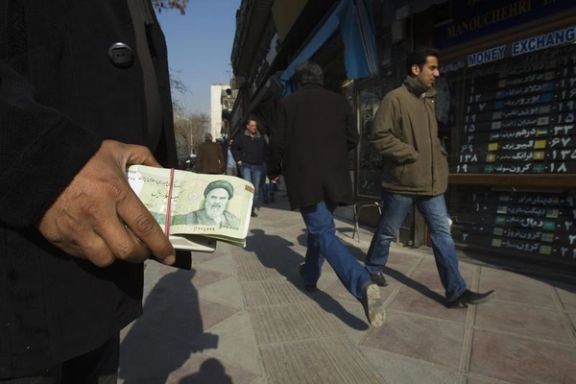
Amid Iran’s claim of stronger economic resilience thanks to higher foreign currency reserves, there are increasing calls for more effective enforcement of US sanctions.
The deputy chief of the Central Bank of Iran, Mohamamd Shirijian, said Tuesday that Iran's foreign reserves are increasing due to the growth of oil and non-oil exports.
He claimed that despite global economic shocks, Iran's GDP grew by 4% in 2022, and the growth rate in Q1 and Q2 of 2023 increased 5.3 and 6.2 percent, respectively.
The claims seem in contradiction to a report by reformist daily Ham-Mihan earlier in the day that forecasted a budget deficit twice as big as the figure in the previous year. The paper said if the country’s revenues in the second half of Iranian year (which ends in March 2024) mirror the trend in the first six months, the budget deficit would significantly worsen in comparison with last year.
It is very difficult to judge the veracity of the Central Bank's optimistic claim, given the lack of any positive movement in Iran's currency markets or the nearly 50-percent annual inflation rate. The current government dominated by hardliners is notorious with making outlandish claims of economic success.
One fact is clear; Iran is exporting much more oil than at any time since early 2018, before the United States withdrew from the JCPOA nuclear deal and imposed tough sanctions on Tehran's oil exports and international banking operations.
Under Trump’s maximum pressure, Iran’s oil exports were down to less than 500,000 barrels per day. Now the figure is reportedly nearly two million barrels. Iran regularly boasts about the rise in its oil exports, but the rise has not translated into tangible changes in the country’s economy.
The national currency rial has lost its value 12-fold since early 2018, when the United States withdrew from the JCPOA and imposed 'maximum pressure' sanctions. This has made imports much more expensive and has led to very high inflation at around 50 percent for the past three years. In recent weeks, the rial lost its value even further to stand at about 520,000 against the dollar over the crisis in Israel and talks of refreezing $6 billion recently released from South Korea under a prisoner swap deal with the US.
In a letter published Monday night, 63 Democrat and 50 Republican US lawmakers called on President Joe Biden to ensure maximum enforcement of all US sanctions and taking any and all steps to end Iran’s oil trade with China, which currently brings in well over $100 million per day in revenue.
In a separate initiative Tuesday, a group of Senate Republicans demanded once more that the administration refreeze the $6 billion parked at Qatari banks as part of a deal to free five hostages from Tehran.
“We know that Iran bankrolls Hamas,” said Senator Balckburn, leading the group. “It is perplexing why this administration refuses to issue a formal decision to freeze the $6 billion. We need to ensure that not another dollar goes to Iran.”
Senator George Marshall, one of the more vocal members of the Senatorial group who demanded the ‘refreeze’ on Tuesday, claimed that under Biden, Iran's currency reserves have gone “from $6 billion to $60 billion” because the regime has been allowed to sell “a billion dollars’ worth of oil every week to China.”
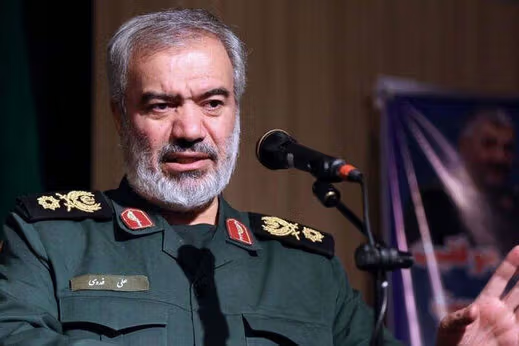
The deputy commander of Iran’s Revolutionary Guard stated on Wednesday that Hamas successfully disrupted efforts to normalize relations between Saudi Arabia and Israel with its attack.
Fars news website affiliated with the IRGC quoted Gen. Ali Fadavi as saying that “Normalization of relations by Saudi Arabia and some Arab countries with the regime occupying Quds was a malicious conspiracy that Americans pursued. They had prepared this conspiracy and were trying to implement it. They had worked on this for years and had reached a particular point.”
Many observers and analysts have commented that the brutal attack by Hamas on October 7 was aimed at derailing talks between the Israel, Saudi Arabia and the United States to reach a normalization deal.
Fadavi stated that with the Hamas attack the normalization efforts totally failed and “those who intended to pursue the effort have now adopted positions against the Zionist regime.”
Top Iranian officials and government media celebrated the Hamas attack as it was unfolding on October 7 and immediately organized street celebrations by regime supporters in Tehran.
Supreme Leader Ali Khamenei dismissed the killing of more than 1,200 Israeli civilians in a speech on Tuesday, saying they were armed and not considered civilians. He also said that many more Palestinians have been killed in Israeli attacks on the Gaza Strip.
The Islamic Republic had never before so openly demonstrated its ties with, and support for militant Arab organizations as it has done since the Hamas attack. Some of these groups in Iraq and Yemen have even threatened the United States if it continues it support for Israel.
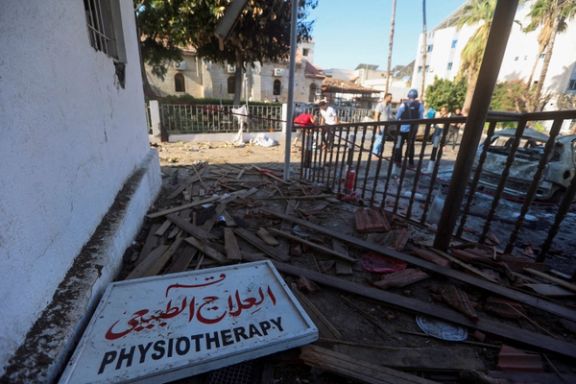
In spite of evidence pointing to the blast coming from a misfired rocket from Islamic Jihad in Gaza, the Iranian regime has called Israel responsible for an attack on the Gaza Baptist hospital on Tuesday night.
The Israel Defence Forces have shared a barrage of intelligence to deny culpability but the regime vowed the incident "will definitely not go unanswered" in another opportunity to fuel the flames of unrest.
A statement on the state news agency said, "Islamic countries and freedom-seeking governments, in addition to severing ties with Israel, should expel its ambassadors and representatives from their countries and international organizations".
Iran also declared that it is necessary for all Muslim nations and Islamic governments to stand against “the illegitimate regime of Israel” and, using all necessary means, put an end to “the endless injustice and the massacre of innocent Muslims.”
An explosion occurred at the al-Ahli Baptist Hospital, a Christian-run medical facility in central Gaza City on Tuesday night, resulting in the deaths of at least 200 to 300 people, as reported by the Palestinian Health Ministry. However, other Palestinian sources cite numbers as high as 1,000.
The ministry's spokesperson, Ashraf Al Qudra, estimated that around 200 others were injured. There have been conflicting claims about responsibility, with officials in Gaza and Israel blaming each other for the tragedy.
Al Qudra alleged that the Israel Defense Forces had targeted the hospital for bombing, and Hamas also blamed Israel, while no evidence of a damaged hospital and hundreds of dead or injured has yet been seen. The damage largely remains contained to a car park and shattered windows.